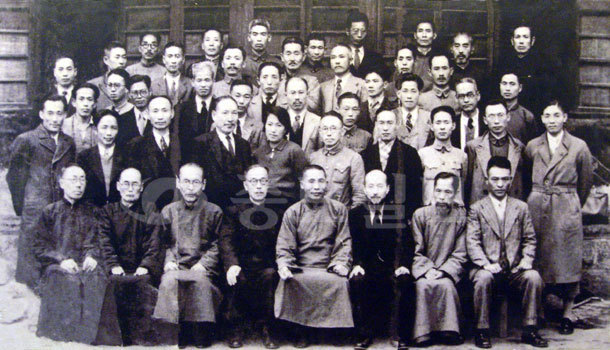Posted on : Apr.11,2019 15:18 KST
Modified on : Apr.13,2019 08:55 KST
 |
|
The founders of the Korean Provisional Government in Chongqing, China, in October 1942. (Hankyoreh archives)
|
Apr. 11 marks 100 years to the day since the Korean Provisional Government (KPG) was established in Shanghai to resist Japanese imperialism. We are filled with respect for the innumerable patriotic martyrs who fought for independence from Japan, enduring hardships overseas as they struggled to reclaim their lost fatherland. Thanks to their dedication and sacrifices, the Republic of Korea has emerged as a proud economic and cultural power in the world. Yet some of the tasks that the provisional government in Shanghai sought to accomplish remain before us as we greet the next 100 years. As we consider the dream of peace and reunification on the Korean Peninsula and the principle of a democratic republic where sovereignty lies with the people, we ponder once again the meaning of the KPG today.
The spirit and aims of that government are evident in the Constitutional Charter of the Provisional Government of the Republic of Korea, which was formally proclaimed in November 1919 following its Apr. 11 enactment by the Provisional Assembly and subsequent supplementation. Consisting of eight chapters and 58 items in all, Articles 1 and 2 of the KPG’s Constitution stated that the Republic of Korea “is organized by the people of Korea,” and that its sovereignty “lies with all of the Korean people.” The words delivered by actor Song Kang-ho in the film “The Attorney” that so moved the hearts of 10 million viewers – “According to Articles 1 and 2 of the Republic of Korea’s Constitution, the Republic of Korea’s sovereignty lies with the people, and all authority comes from the people” – are fully present in KPG’s Constitution as it was written 100 years ago.
It is of particular significance to us today that the same spirit of “sovereignty resting with the people” proclaimed by the candlelight protestors, who led the 2016 campaign to impeach a president who had betrayed her public, had originated in the provisional government and been carried on after Korea’s liberation.
In that sense, it is a clear and undebatable truth that the provisional government in Shanghai represents the origins of the South Korean government’s legitimacy and a driving force behind Korean society. For the past decade or so, however, certain New Right figures and other conservatives have been repudiating the KPG’s tradition and presenting the incomprehensible argument that the date of the South Korean government’s establishment on Aug. 15, 1948, should be elevated to “national foundation day” status. This is a perverse attempt to bury the struggle against Japan and the value of democracy, focusing exclusively instead on the right wing’s battle against the left. Hopefully, the centennial of the KPG’s foundation will be an occasion for correcting these misguided historical perceptions and overcoming our national divisions.
A century later, the KPG is at the very heart of our society here and now. The dogged efforts to establish a unified South and North Korean government after the emotional return of Kim Koo and other either key KPG figures (in the post-liberation era) are echoed in our own efforts today to achieve peace and reunification on the Korean Peninsula. The floor leader of the Liberty Korea Party, the top opposition party in the National Assembly, recently argued that the Special Investigation Committee of Antinational Activists “divided the South Korean public,” which is reminiscent of the survival of people who had collaborated with Japan in the wake of liberation, a cohort that provided the foundation for the dictatorship that soon followed. The value pursued by the KPG – the idea that sovereignty rests with the people – still appears poised on the edge of a precipice. It is in the same sense that the task of “ending an era of foul play and special prerogatives” declared by President Moon Jae-in remains something for us to address today.
The KPG formed 100 years ago is not simply a piece of the distant past or a fossilized historical incident. At this moment in April 2019, the battle to uphold those values continues to rage.
Please direct comments or questions to [english@hani.co.kr]






